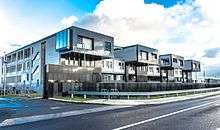Department of Defence (Ireland)
| Department overview | |
|---|---|
| Formed | 22 January 1919 |
| Jurisdiction | Ireland |
| Headquarters |
Station Road, Newbridge, County Kildare W12 AD93 53°10′50″N 6°47′45″W / 53.18042°N 6.79590°W |
| Ministers responsible | |
| Department executive |
|
| Website |
www |

The Department of Defence (DoD) (Irish: An Roinn Cosanta) is the department of the Government of Ireland that is responsible for preserving peace and security in Ireland. The department is led by the Minister for Defence who is assisted by one Minister of State.
Departmental team
The official headquarters of department are at Station Road, Newbridge, County Kildare. The departmental team consists of the following:
- Minister for Defence: Enda Kenny, TD
- Secretary General of the Department: Maurice Quinn
History
The Department of Defence was created at the very first meeting of Dáil Éireann on 21 January 1919. Over the years the role of the Department has remained exactly the same. The Department has been known simply as the Department of Defence since 1919, however on some occasions it has been coupled with the Marine portfolio.
Structure
The mission of the Department of Defence is to meet the needs of Government and the public by providing value for money defence and civil defence services and by co-ordinating and overseeing the emergency planning process via the Office of Emergency Planning (OEP). The Department is also concerned with ensuring the secure and stable environment necessary for economic growth and development in Ireland. The military budget was €1.005 Billion in 2007 (estimated) and €1.354 Billion in 2010.[1] By 2015 the budget had been cut to €885 Million and is projected to stay at that level until 2017 according to the latest Department of Finance report.[2]
The Department oversees the operations of the Irish Defence Forces whose roles are:
- to defend the State against armed aggression; this being a contingency, preparations for its implementation will depend on an ongoing Government assessment of the security and defence environment
- to aid the civil power (meaning in practice to assist, when requested, the Garda Síochána, who have primary responsibility for law and order, including the protection of the internal security of the State)
- to participate in multinational peace support, crisis management and humanitarian relief operations in support of the United Nations and under UN mandate, including regional security missions authorised by the UN
- to provide a fishery protection service in accordance with the State’s obligations as a member of the European Union
- to carry out such other duties as may be assigned to them from time to time, e.g. search and rescue, air ambulance service, Ministerial air transport service, assistance on the occasion of natural or other disasters, assistance in connection with the maintenance of essential services, assistance in combating oil pollution at sea
The Department has also had responsibility for the Irish Red Cross since 1939.
When not engaged in military operations at home or overseas, most defence organisations concentrate on training and preparation and not on the provision of non-military services. The Defence Forces have achieved very high levels of training and preparation in recent years while also providing a wide range of services to other Government Departments and agencies. The Defence Forces Training Centre at the Curragh Camp is staffed by 1,300 soldiers and 300 civilians.[3]
Records are maintained by the Irish Military Archives.
References
- ↑ See updated List of countries by military expenditures
- ↑ Government Budget Report - Expenditure Allocations 2015-17 (PDF) (Report). Department of Finance. Retrieved 26 February 2015.
- ↑ http://www.kildare.ie/defenceforces/goc.HTM Training numbers, 28 May 2011.